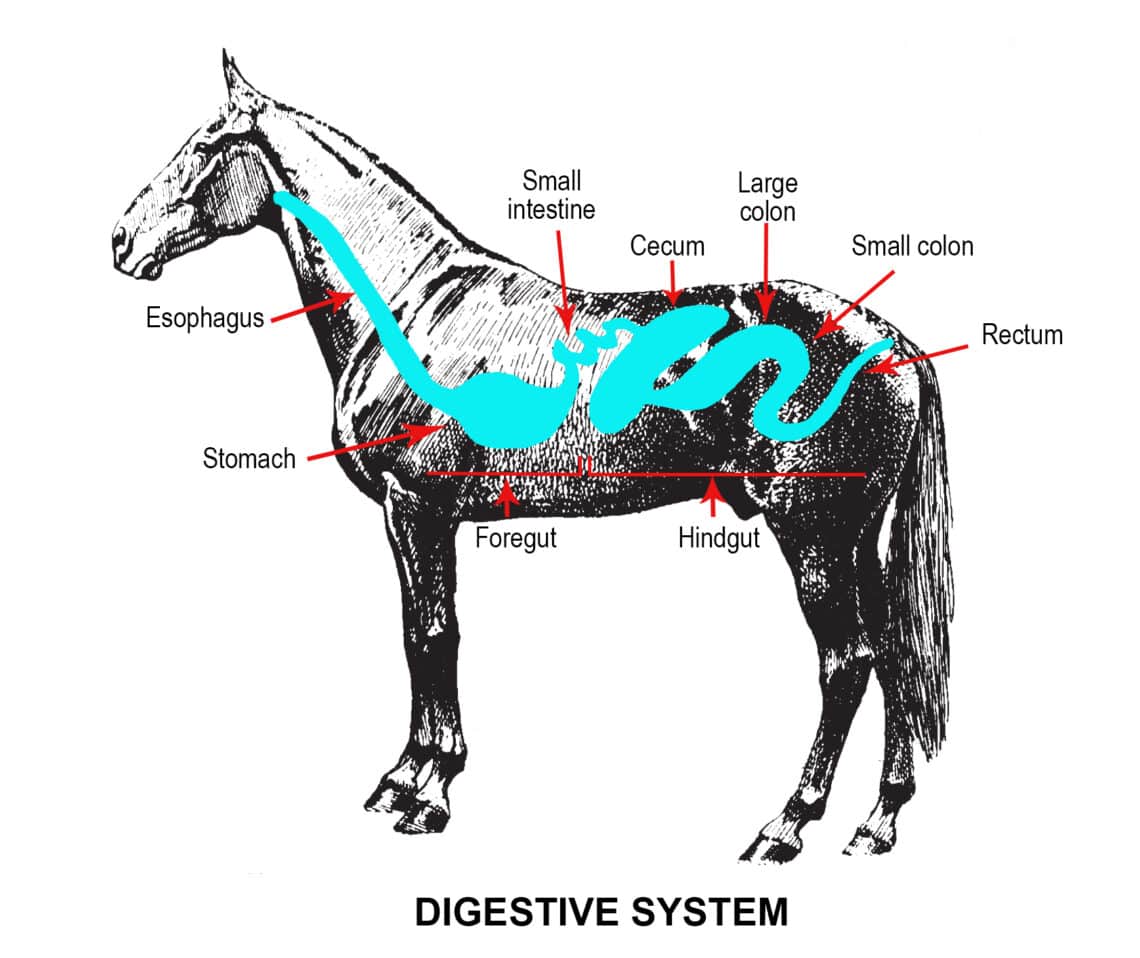Prebiotics and probiotics. Are these just fancy additives in horse feed, or is there more to the story? Equine nutritionist HOLLY MILLS explains.
There are many digestive supplements for horses that include prebiotics and probiotics in their formula. Both are scientifically proven additives that benefit the horse’s hindgut, and it’s important to understand how they function. So, let’s dive into an overview of your horse’s hindgut, how it works, and what you can do to help support healthy digestion.
The importance of the hindgut
The hindgut is an integral part of a horse’s digestive system. It hosts a whole ecosystem of microbes whose main job is to ferment roughage (hay, chaff, and other fibre sources). Microbial fermentation is your horse’s main way of sourcing energy and nutrients – simply put, microbes are the often overlooked heroes of digestion and much of what we feed is not actually feeding your horse, it’s nourishing the microbial population.
Fibre supports the microbiome in the hindgut. However, if sugars and starches spill into the hindgut without first being properly digested it can be hugely problematic and may trigger digestive disorders. Most horses are capable of handling some starch/sugar in their diet, but we must take care not to overfeed them; too much can leak into the hindgut where it rapidly ferments. This fermentation process produces lactic acid, heat, and gas, all of which can upset the balance of the microbiome. When this happens, beneficial microbes are likely to die, thus decreasing the microbiome’s ability to break down feed and create nutrients, which is detrimental to your horse’s general health.

Microbial death also releases a toxin that can enter the bloodstream and lead to endotoxemia, a cause of laminitis, shock and even death if not treated promptly. Clearly, keeping the hindgut and its microbiome happy is key to your horse’s overall wellbeing.
So, what is a prebiotic?
A prebiotic is a non-living feed additive that supports beneficial gut microbes. Some prebiotics have a protective effect by preventing pathogenic organisms from inhabiting the hindgut. When the microbial population of the hindgut is healthy it prevents unfavourable organisms from growing and causing disease.
There are a number of commonly fed probiotics, including Mannan Oligosaccharides, the non-digestible carbohydrates found in the cell walls of yeast or other microorganisms. Research has shown that horses receiving a prebiotic demonstrated improved performance – an excellent reason to support a healthy digestive system in sporthorses.
And what is a probiotic?
A probiotic is a microbe that lives in the digestive tract where it boosts digestive health. Probiotics are often used in human nutrition (yogurt and kombucha are great examples) to support gut health, but they are also beneficial in equine nutrition.
The most commonly used and most thoroughly researched probiotic given to horses is the live yeast Saccharomyces cerevisiae (SC). Studies have shown that SC is able to survive the journey through the digestive tract to populate your horse’s hindgut. This a critical factor to consider when you’re looking for a probiotic, because there’s no point adding a live organism to their diet if it dies on the way to its destination.
And it’s not just the internal journey that a probiotic needs to withstand! A high-performing probiotic must also endure the manufacturing process, packaging, and storage – and SC has demonstrated its ability to tick all those boxes.
Once in the hindgut, SC gets to work by:
- Improving fibre digestion
- Stabilising the microbial population
- Improving energy production
These very beneficial outcomes are particularly helpful for horses that are in work, consuming large amounts of grain, or are under stress. There are other equine probiotics which show promise in terms of their viability and beneficial effect. However, more research is required to better understand their potential.
Feeding a supplement
Supplementing your horse’s diet with pre- and probiotics is a good idea regardless of their health status. Many horses are at risk from the negative impact that stress and a variety of dietary factors can have on their digestive function. Look at your horse and ask:
- Is their manure normal?
- Are they underweight or needing improved condition?
- Is their coat in good condition?
- Are they gassy?
- Do they consume grain?
- Are they under stress?
- Are they a performance horse?
These are all factors to consider when you are contemplating adding a pre- or probiotic to your horse’s diet. Even in an otherwise healthy horse, pre- and probiotics can only help to increase their overall wellbeing and the health and efficiency of their digestive tract.
Which to choose?
Pre- and probiotics are included in many digestive supplements. When choosing a supplement, consider the type and quantity of prebiotic or probiotic that has been added to ensure your horse will receive the full benefit. Also, consider the form that the product is in. Because they are living organisms, probiotics are very sensitive to heat, which is why most products containing a probiotic are in powder form to protect them from processes involving heat. Probiotics are most commonly found in muesli style equine feeds as they can be added towards the end of the mixing process, avoiding exposure to heat. Prebiotics are more stable and can withstand heat.
Understanding the way your horse’s hindgut functions and how that impacts their overall health is the first step in learning how to care for and support it. Although we may not be able to allow horses free rein to graze naturally, we are still able to provide them with what they need to maintain healthy gastrointestinal functioning. High quality prebiotics and probiotics are an excellent addition to any horse’s diet and they can be fed without negative impacts to their digestive health. They’re a great way to ensure that your horse is happy, healthy, and comfortable year-round.
Interested to learn more? Take advantage of the free diet analysis available at Nutrikey, visit Hygain, or email nutrition@hygain.com.au for more information.



